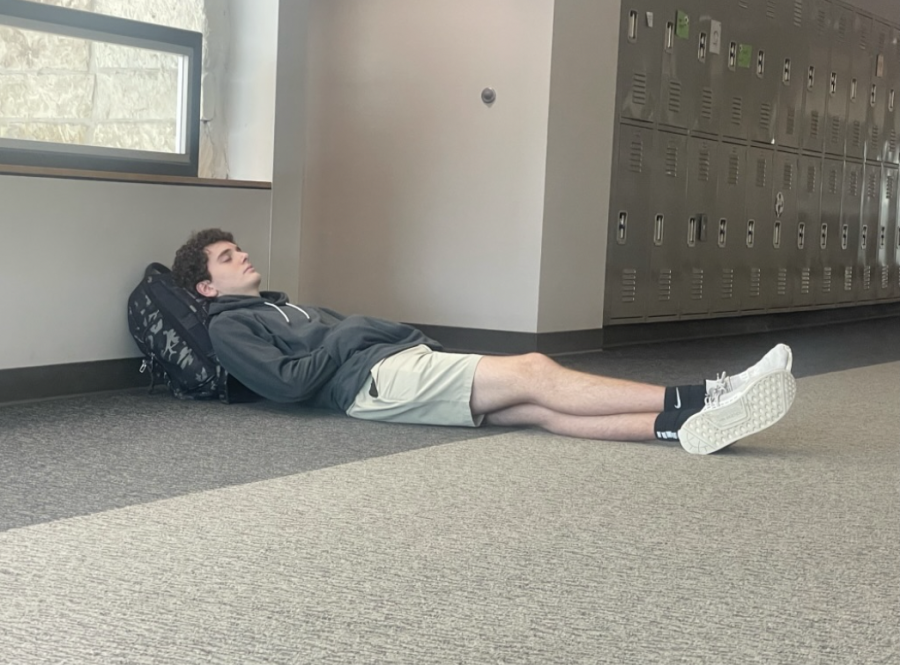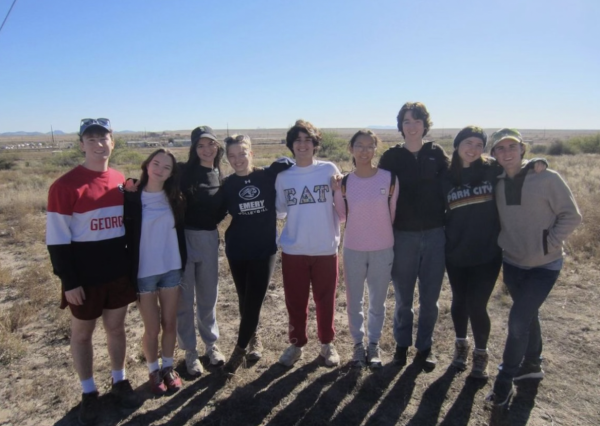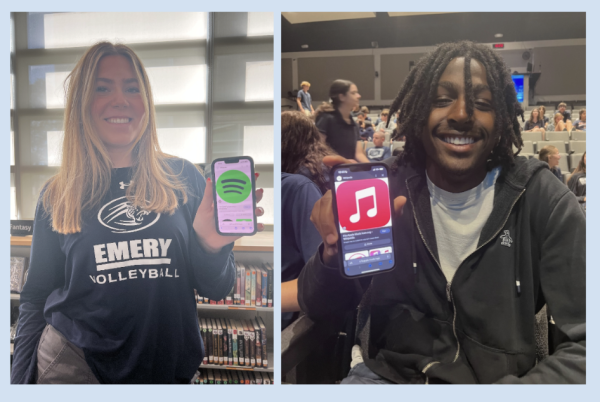Sleeping Habits of the Student Body
Junior Will Hancock in the US hallway taking a quick snooze between classes
November 16, 2022
It is the morning of Friday, Oct. 14, 7:45 a.m. Finally, the end of the week. One by one, students trickle into the Commons with their backpacks lazily slung over their shoulders, eyes sunken in. As each person saunters in, they find their way to lunch tables, half-mumbling hellos to their friends, pulling out school supplies, and preparing for the long day ahead. Discussions about the length of last night’s homework and the need to finally unwind during the weekend fill the cafeteria. Members of different grade levels all crowd around different tables, yet they have similar conversations. “I barely slept last night,” a freshman says, rubbing their eyes. The zombie-like state of so many students at this early hour begs the question: how much sleep did they really get last night?
A survey open to the entire Upper School concluded that most students wish they had better sleeping habits. However, even among their current sleeping habits, students report vastly contrasting sleep schedules ranging from less than four to ten hours of sleep, indicating that the amount of sleep differs from person to person.
Sophomore Emily Williams averages around eight hours of sleep every night, an ideal amount for many students. Nonetheless, for Williams, whenever it is “finals, midterms, lacrosse season, or when grades are due,” her sleep schedule can be compromised. On a day when she gets less sleep than desired, it can affect her morning classes and overall mood. But for her, waking up earlier, taking advantage of study hall, or “taking the missing assignment” is worth getting to bed before the morning hours. Sleep has become so much of a priority that her after-school productivity relies on taking a nap before starting any homework, a habit she “knows is bad.” Overall, even when homework and activities pile up, Williams believes that sleep is a “necessity” and “what will keep [her] going throughout the week.”
Sleep regimens are not ‘a one size fits all’ for students. Junior Maddie Risch will only go to bed if all of her work is complete, “even if that is later than [she] want[s] it to be.” Most of the time, she’ll “study up until going to sleep” and sometimes Risch will even “put flashcards under [her] pillow.” While Risch understands the importance of sleep, she “won’t be able to sleep knowing [she] still has work left.”
School can undoubtedly be a stressful time, but many feel that it’s important for students to not only participate in extracurriculars and study hard, but to also get a good amount of shut-eye. Upper School guidance counselor Laura Larkin believes that “teenagers really need sleep” because “there is so much going on brain development-wise,” even more so than any other age group. She understands that, “your schedule’s not always your own” and that the amount of work students have can be a catalyst for excess stress and less sleep. She realizes that many students’ evening routines do not start until the end of after-school activities when they get home after already working “a 10-hour day.”
According to Larkin, a healthy evening for students would include “getting home, showering, getting some dinner” where “nutrition is another piece” and then “trying to dive in and do the homework stuff that needs to get done first rather than pushing it off till later when you are super tired.” The best way to reduce stress and avoid “burning the midnight oil” is to “unwind for a minute, but not waiting too long.” While she understands how sleep deprivation pushes students to take long naps the minute they get home, this can overall do more harm than good. According to Larkin, “Our bodies like routine, and when you’ve given yourself like a 3-hour nap; it totally throws off the night sleep that you need to get.”
In order for Emery to sponsor a healthy student routine, Larkin says, “there are a lot of things we look at as a school to try to help make sure people are not super overloaded.” The most important thing is “knowing how to prioritize.” At Emery, there are resources for students including Larkin who is available for personal consultations that students can utilize to help themselves schedule their time wisely and make sleep a priority.











Elah • Nov 17, 2022 at 9:39 am
Great piece Natalie!!!
Ashley Burdine • Nov 16, 2022 at 8:03 pm
Forewarning to all high schoolers: college does not get better with this. Be prepared to work off of wacky sleep schedules. Something to make it easier is scheduling as little as possible or no classes on Fridays. 3 day weekend
Michael • Nov 16, 2022 at 11:11 am
Enjoyed the article. It was well written. One of the reasons young adults need to sleep until noon hour on the weekends is because of pressure/stress and over stimulation. Maybe schools should teach students how to relax and meditate so they can reduce stress and re-generate themselves . Loved the photo.